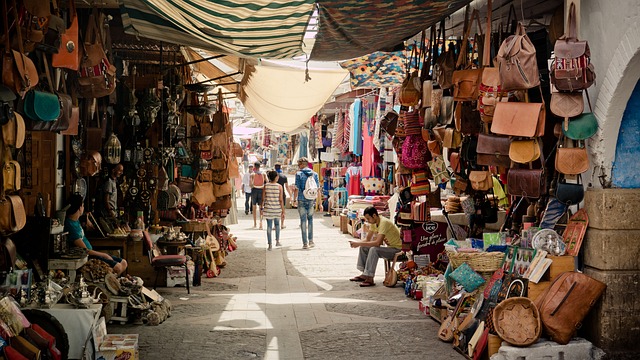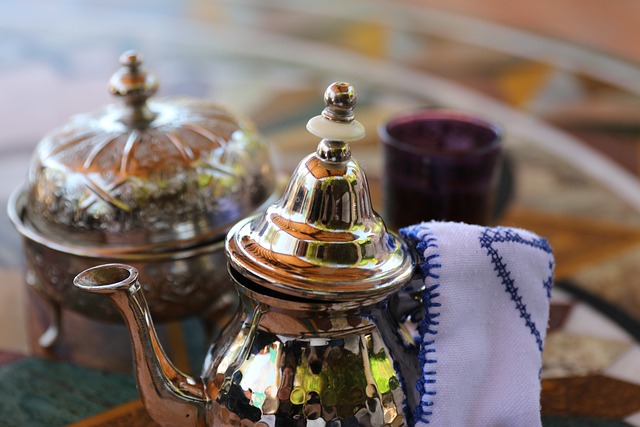
There’s no doubt about it, Moroccans are the best at negotiation and if your want to get good at this life skill then there is no better place to practice it than in Morocco, where almost every price can be haggled.
With our knowledge of Moroccan culture and negotiation, we were able to get a better deal on our apartment rent than previous renters of the same apartment. See how you can improve your negotiating skills and get better deals with our tried and tested tips.
Table of Contents
Top Tips for Haggling and Negotiation in Morocco
1. Understand what prices can and can’t be negotiated
- Petit Taxis – Petit taxis in cities work on a meter so no negotiation is possible. However, in small towns taxis sometimes have a set price for certain routes and may be open to negotiating for alternative routes.
- Grand Taxis – If you are taking a standard route with a grand taxi then you will pay the standard price per seat, but if you are requesting a special destination, or pick up at a certain time and place, then get ready to bargain with the driver.
- Groceries – Fruit, vegetables and other groceries sold in a market or grocery store generally don’t get haggled over, unless it’s near the end of the market day and the market traders are about to pack up.
- Eating Out – Restaurants, fast food places and cafés are generally not open to negotiation but if you have a large group with you, you should definitely ask for a special deal.
- Shops with price tags – There may be some possibility to haggle a little, even if the seller initially says “no reductions”.
In most other situations it is expected to haggle over the price. I have negotiated with seamstresses, builders, truck drivers, landlords, accountants, …
2. Ask Around
Our Moroccan friends often ask us how much we paid for something which felt weird at first. In fact, this is normal and how Moroccans get a feel for current prices (so they can haggle better). You can do this too. Ask around. People generally aren’t embarrassed by being asked how much they paid for things.
How much does the same or similar products/services cost? We told a grand taxi driver that we would pay him 200 DH for a certain route, he asked for 250 DH but when I said we had previously paid other taxi drivers 200 DH for the exact same route, he quickly agreed to our price.
Is it a buyer’s or seller’s market? If there is a high availability for a product or service and not many possible clients at that time, then you will know that you can drive a harder bargain. In the case of the apartment we wanted to rent, we knew it had been vacant for months with no-one else showing any interest so we knew we had a significant advantage.
Do your research and you will be in a much stronger position to get a good deal.
3. Set yourself a limit
Before you start haggling over an item, be clear in your own mind about the maximum you are prepared to pay. Maybe write it down or tell someone else if necessary to keep you from going over your limit. If this is really difficult for you, then maybe limit how much money you take with you or bring along a friend to help you stick to your limit.
4. Build a Relationship

In Morocco, everything revolves around relationships and community. People are much less individualistic and rely on each other much more than in the west. In Moroccan culture, the person in front of them and the relationship with that person is the most important thing and this is at the heart of how their community functions.
You will go further in a negotiation if you can establish a good relationship with the seller, if they can see that they can trust you. No need to fake anything (Moroccans are excellent people readers). Just take the time and let the rapport develop, don’t be in a rush. Sit down, drink some tea and enjoy getting to know the person you’re bargaining with.
5. Set the Scene
One friend of ours started a negotiation by saying “I’m not a rich man”. This honest declaration of limited means helped the negotiation start on a better footing because the seller was sympathetic and had lowered his expectations.
In the case of our rental negotiation, we first told the landlady how much we were currently paying for rent and expressed a wish to pay the same amount. We knew that she would never accept the same price for her larger apartment but it meant that she couldn’t expect a much higher price.
6. Know What You Bring to the Deal
In general, landlords in our town would much rather rent to foreigners because they have a good reputation of paying the rent and not damaging property. So, the simple fact that we are foreigners meant that we brought a benefit to prospective landlords.
In our negotiation, it wasn’t just money that we were offering, it was also peace of mind. What are you offering beyond just money and how can you leverage this to get a better deal?
7. Don’t Just Negotiate Money
During a negotiation, you many also be able to negotiate better terms and conditions or get an add-on item. If you are going to need to raise your starting price, see what you can get in return for that. When our landlady suggested a price a little above our initial offer, we said we would only agree to the price if she extended the contract to 5 years. So we got the conditions improved in return for us accepting a price above our initial offer.
8. Use Moroccan Phrases
We have observed Moroccans buying household objects from the market. The prices are generally quite low with little room for reduction but, even so, Moroccans will ensure they get the best deal possible with this handy phrase: “3afak nqeS shweeya” (please reduce a little). I’ve used it myself and found it usually works well because it is a polite and culturally acceptable request that encourages a little effort on the part of the seller to clinch the deal. Only use this phrase if you think the price is already quite reasonable as you will only get a small reduction in response.
9. Renegotiate as Needed
If circumstances change, renegotiation is sometimes possible. Our accountant reduced his previously agreed fees when we explained that we were thinking of closing the business down. After our accountant had spent 20 minutes listing every reason he could think of for us to hold onto the business, he eventually made us an offer to reduce his fees by 30% “to help us out”. It was better for him to have a lower paying client, than to have one less client.
10. Finish Well
Whatever the final result, be sure to end your conversation in a way that shows you value the effort that the seller has made. It may help you get a better deal next time.
Plus, when you have negotiated well, the seller will hold you in high esteem, even if they had to make some concessions. Haggling and negotiation is part of the culture, and your skills in doing this will help you to fit in and be accepted into a community that loves to relate in this way.
We only make recommendations that we believe are genuinely helpful. When you buy through our links, we may earn a commission. Learn more >
Recommended Resources
If you would like to improve your skills further, here are some well-known books written by experts in negotiation:
1. “Never Split the Difference: Negotiating As If Your Life Depended On It” by Chris Voss & Tahl Raz
Written by a former FBI kidnapping negotiator. The author shares counter-intuitive strategies that can be applied to all kinds of negotiating situations.

2. “Influence: The Psychology of Persuasion” by Robert B. Cialdini
Focusing on the psychology of influence and persuasion, this book provides a practical application of the author’s extensive scientific research.

This book deals with negotiation in conflict resolution, whether in a personal or professional context. It is based on the work of the Harvard Negotiation Project, a group that deals with all levels of negotiation and conflict resolution.

Conclusion
- Haggling and negotiation is an important part of Moroccan Culture, and can be an enjoyable and rewarding experience.
- With some research and some knowledge of the culture, you can easily improve your negotiation outcomes.
- If done well, you will not only come out with the product or service you wanted at the best possible price, you will also have made a friend.
Have you used any of the methods above when haggling in Morocco? How did it go? Do you have other negotiation tips you’d like to share? Let us know in the comments.

Leave a Comment